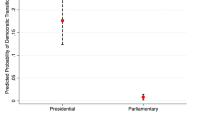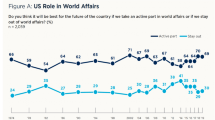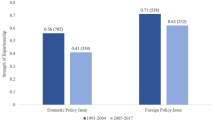Abstract
Executive autonomy influences the ability of states to make credible commitments, utilise their domestic resources, and deter adversaries. In majoritarian parliamentary regimes, it is often assumed that executive autonomy is derived from the possession of a substantial parliamentary majority, since this affords the government a ‘buffer’ in the legislature. Yet, this understanding fails to account for the value of seats above the majority threshold for foreign policy, where the executive is constrained by internal dissent more than the non-passage of legislation. This article challenges the assumption of a linear relationship between seat share and executive autonomy through a theoretical re-examination of the politics of foreign policy in majoritarian parliamentary systems. It argues that possession of a significant majority can actually undermine the executive’s foreign policy autonomy, since it increases the degree of intra-party factionalism without introducing corresponding benefits in the legislature. The argument is illustrated empirically through an examination of the politics of British foreign policy at three decisive elections (1950, 1955, and 1966) in the early Cold War period.

Similar content being viewed by others
Notes
-
Elman (2000) is a rare exception, although as I have noted above, her work also buys into the assumption that executive autonomy increases in line with legislative seat share.
-
As Fig. 1 demonstrates, it matters little to the classification scheme if we reduce this threshold. The only potentially borderline case is the majority of 16 held by the Conservatives after the 1951 election, and in this case, it is clear that the government was concerned about the slightness of its majority (Ramsden 1995, 261).
-
To avoid the charge of selecting on the dependent variable, it should be noted that factionalism is a necessary condition for dissent, but does not guarantee its occurrence. As I shall argue, it is changes in the governing party’s seat share that determines variation in the level of dissent, not the existence of factionalism per se.
-
Minutes of meeting between Ford, Kissinger and Scowcroft, 14 August 1974, Gerald Ford Papers.
References
Allison, G.T. 1971. Essence of Decision: Explaining the Cuban Missile Crisis. Boston: Little, Brown.
Anderson, C.J., and C.A. Guillory. 1997. Political Institutions and Satisfaction with Democracy: A Cross-National Analysis of Consensus and Majoritarian Systems. American Political Science Review 91(1): 66–81.
Auerswald, D.P. 1999. Inward Bound: Domestic Institutions and Military Conflicts. International Organization 53(3): 469–504.
Bale, T. 1999. Harold Wilson 1963–76. In Leading Labour: From Keir Hardie to Tony Blair, ed. K. Jeffreys. London: I.B. Tauris.
Bale, T. 2017. Snap election a win-win for Theresa May: she’ll crush Labour and make Brexit a little easier. The Conversation. Available at https://theconversation.com/snap-election-a-win-win-for-theresa-may-shell-crush-labour-and-make-brexit-a-little-easier-76362. 18 April.
Barnaby, F. 1969. The Nuclear Future. London: Fabian Society.
BBC. 2003. Blair wins backing amid revolt. http://news.bbc.co.uk/1/hi/uk_politics/2862325.stm. 19 March.
BBC. 2015. David Cameron’s Colossal Achievement. http://www.bbc.co.uk/news/election-2015-32651603.
Bennister, M. 2008. Blair and Howard: Predominant Prime Ministers Compared. Parliamentary Affairs 61(2): 334–355.
Bevan, A., H. Wilson, and J. Freeman. 1951. One Way Only: A Socialist Analysis of the Present World Crisis. London: Tribune Publications.
Black, L. 2001. ‘The Bitterest Enemies of Communism’: Labour Revisionists, Atlanticism and the Cold War. Contemporary British History 15(3): 26–52.
Boucek, F. 2009. Rethinking Factionalism: Typologies, Intra-Party Dynamics and Three Faces of Factionalism. Party Politics 15(4): 455–485.
Boyle, K. 2003. The Price of Peace: Vietnam, the Pound, and the Crisis of the American Empire. Diplomatic History 27(1): 37–72.
Bräuninger, T., and M. Debus. 2009. Legislative Agenda-Setting in Parliamentary Democracies. European Journal of Political Research 48(6): 804–839.
Brown, G. 1972. In My Way. Harmondsworth: Penguin.
Bueno de Mesquita, B. 2002. Domestic Politics and International Relations. International Studies Quarterly 46(1): 1–9.
Butler, D. 1955. The British General Election of 1955. London: Macmillan.
Buzan, B., O. Wæver, and J. de Wilde. 1998. Security: A New Framework for Analysis. London: Lynne Rienner.
Callaghan, J. 2001. The Left and the ‘Unfinished Revolution’: Bevanites and Soviet Russia in the 1950s. Contemporary British History 15(3): 63–82.
Callaghan, J. 2007. The Labour Party and Foreign Policy: A history. London: Routledge.
Clare, J. 2010. Ideological Fractionalization and the International Conflict Behaviour of Parliamentary Democracies. International Studies Quarterly 54(4): 965–987.
Colman, J. 2003. Harold Wilson, Lyndon Johnson and Anglo-American ‘summit diplomacy’, 1964–68. Journal of Transatlantic Studies 1(2): 131–151.
Colman, J. 2004. A ‘special relationship’?: Harold Wilson, Lyndon B. Johnson and Anglo-American relations ‘at the summit’, 1964–68. Manchester: Manchester University Press.
Cox, G.W. 1990. Centripetal and Centrifugal Incentives in Electoral Systems. American Journal of Political Science 34(4): 903–935.
Crossman, R. 1975. The Diaries of a Cabinet Minister: Volume 1, Minister of Housing 1964–66. London: Hamish Hamilton.
Crossman, R.H.S., Foot, M., and I. Mikardo. 1947. Keep Left. London: New Statesman and Nation.
Crowcroft, R., and K. Theakston. 2013. The Fall of the Attlee Government, 1951. In How Labour Government’s Fall: From Ramsay MacDonald to Gordon Brown, ed. T. Heppell and K. Theakston. Basingstoke: Palgrave Macmillan.
Davies, J.L., and C.K. McDaniel. 1994. A New Generation of International Event-Data. International Interactions 20(1–2): 55–78.
Diermeier, D., and T.J. Feddersen. 1998. Cohesion in Legislatures and the Vote of Confidence Procedure. American Political Science Review 92(3): 611–621.
Dumbrell, J. 2006. A Special Relationship: Anglo-American Relations in the Cold War and After, 2nd ed. Basingstoke: Palgrave Macmillan.
Duverger, M. 1964. Political Parties: Their Organization and Activity in the Modern State. London: Methuen.
Elman, M.F. 2000. Unpacking Democracy: Presidentialism, Parliamentarism, and Theories of Democratic Peace. Security Studies 9(4): 91–126.
Fielding, J. 1999. Coping with Decline: US Policy Towards the British Defence Reviews of 1966. Diplomatic History 23(4): 633–656.
Fitzsimmons, M.A. 1953. The Foreign Policy of the British Labour Government 1945–1951. Notre Dame: University of Notre Dame Press.
Fordham, B.O. 2002. Domestic Politics, International Pressure, and the Allocation of American Cold War Military Spending. Journal of Politics 64(1): 63–88.
Franck, T.M., and E. Weisband. 1979. Foreign Policy by Congress. Oxford: Oxford University Press.
Gallagher, M. 1991. Proportionality, Disproportionality and Electoral Systems. Electoral Studies 10(1): 33–51.
Glaser, C.L. 2010. Rational Theory of International Politics: The Logic of Competition and Cooperation. Princeton: Princeton University Press.
Gordon, M.R. 1969. Conflict and Consensus in Labour’s Foreign Policy 1914–1965. Stanford: Stanford University Press.
Hagan, J.D. 1990. Political Opposition and Foreign Policy in Comparative Perspective. Boulder: CO: Lynne Rienner.
Halperin, M.H. 1974. Bureaucratic Politics and Foreign Policy. Washington: Brookings Institution.
Heath, E. 1998. The Course of My Life: My Autobiography. London: Hodder & Stoughton.
Heffernan, R. 2005. Why the Prime Minister Cannot be a President: Comparing Institutional Imperatives in Britain and America. Parliamentary Affairs 58(1): 53–70.
Heppell, T. 2010. The Labour Party Leadership Election of 1963: Explaining the Unexpected Election of Harold Wilson. Contemporary British History 24(2): 151–171.
Holsti, O.R. 1996. Public Opinion and American Foreign Policy. Ann Arbor: University of Michigan Press.
Huber, J.D. 1996. The Vote of Confidence in Parliamentary Democracies. American Political Science Review 90(2): 269–282.
Hughes, G. 2003. A ‘Missed Opportunity’ for Peace? Harold Wilson, British Diplomacy, and the Sunflower Initiative to End the Vietnam War, February 1967. Diplomacy & Statecraft 14(3): 106–130.
Kaarbo, J. 1996. Power and Influence in Foreign Policy Decision Making: The Role of Junior Coalition Partners in German and Israeli Foreign Policy. International Studies Quarterly 40(4): 501–530.
Kaarbo, J. 2012. Coalition Politics and Cabinet Decision Making: A Comparative Analysis of Foreign Policy Choices. Ann Arbor: University of Michigan Press.
Katz, R.S., and P. Mair. 1995. Changing Models of Party Organization and Party Democracy: The Emergence of the Cartel Party. Party Politics 1(1): 5–28.
Koch, M.T., and P. Sullivan. 2010. Should I Stay or Should I Go Now? Partisanship, Approval, and the Duration of Major Power Democratic Military Interventions. Journal of Politics 72(3): 616–629.
Kriner, D.L. 2010. After the Rubicon: Congress, Presidents, and the Politics of Waging War. London: University of Chicago Press.
Lijphart, A. 1989. Democratic Political Systems: Types, Cases, Causes and Consequences. Journal of Theoretical Politics 1(1): 33–48.
Lijphart, A. 1990. The Political Consequences of Electoral Laws, 1945–1985. American Political Science Review 84(2): 481–496.
Lijphart, A. 1999. Patterns of Democracy: Government Forms and Performance in Thirty-Six Countries. New Haven: Yale University Press.
Lindsay, J.M. 1992. Congress and Foreign Policy: Why the Hill Matters. Political Science Quarterly 107(4): 607–628.
Lohmann, S., and S. O’Halloran. 1994. Divided Government and U.S. Trade Policy: Theory and Evidence. International Organization 48(4): 595–632.
Mattern, J.B. 2005. Why Soft Power Isn’t So Soft: Representational Force and the Sociolinguistic Construction of Attraction in World Politics. Millennium: Journal of International Studies 33(3): 583–612.
Mearsheimer, J., and S. Walt. 2006. The Israel Lobby. London Review of Books 28(6): 3–12.
Milner, H. 1997. Interests, Institutions, and Information: Domestic Politics and International Relations. Princeton: Princeton University Press.
Milner, H.V., and B.P. Rosendorff. 1997. Democratic Politics and International Trade Negotiations: Elections and Divided Government as Constraints on Trade Liberalization. Journal of Conflict Resolution 41(1): 117–146.
Milner, H.V., and D.H. Tingley. 2011. Who Supports Global Economic Engagement? The Sources of Preferences in American Foreign Economic Policy. International Organization 65(1): 37–68.
Minkin, L. 1978. The Labour Party Conference. Manchester: Manchester University Press.
Moravcsik, A. 1993. Preferences and Power in the European Community: A Liberal Intergovernmentalist Approach. Journal of Common Market Studies 31(4): 473–524.
Norris, P. 2001. Apathetic Landslide: The 2001 British General Election. Parliamentary Affairs 54(4): 565–589.
Oktay, S. 2014. Constraining or Enabling? The Effects of Government Composition on International Commitments. Journal of European Public Policy 21(6): 860–884.
Onslow, S. 1997. Backbench Debate Within the Conservative Party and Its Influence on British Foreign Policy, 1948–57. London: Macmillan.
Owens, J.E. 2003. Explaining Party Cohesion and Discipline in Democratic Legislatures: Purposiveness and Contexts. Journal of Legislative Studies 9(4): 12–40.
Palmer, G., T. London, and P. Regan. 2004. What’s Stopping You?: The Sources of Political Constraints on International Conflict Behavior in Parliamentary Democracies. International Interactions 30(1): 1–24.
Parr, H. 2006. Britain, America, East of Suez and the EEC: Finding a Role in British Foreign Policy, 1964–67. In The Wilson Governments, ed. G. O’Hara and H. Parr, 1964–1970. Reconsidered. London: Routledge.
Peterson, P.E. 1994. The President’s Dominance in Foreign Policy Making. Political Studies Quarterly 109(2): 215–234.
Phythian, M. 2007. The Labour Party, War and International Relations, 1945–2006. London: Routledge.
Pimlott, B. 1992. Harold Wilson. London: Harper Collins.
Putnam, R.D. 1988. Diplomacy and Domestic Politics: The Logic of Two-level Games. International Organization 42(3): 427–460.
Ramsden, J. 1995. The Age of Churchill and Eden, 1940–1957: A History of the Conservative Party. Harlow: Longman.
Rathbun, B.C. 2004. Partisan Interventions: European Party Politics and Peace Enforcement in the Balkans. Ithaca: Cornell University Press.
Rathbun, B.C. 2012. Trust in International Cooperation: International Security Institutions, Domestic Politics and American Multilateralism. Cambridge: Cambridge University Press.
Schultz, K.A. 1998. Domestic Opposition and Signaling in International Crises. American Political Science Review 92(4): 829–844.
Schweller, R.L. 2006. Unanswered Threats: Political Constraints on the Balance of Power. Princeton: Princeton University Press.
Shaw, E. 2006. The Problem of Party Management. In The Labour Governments, ed. P. Dorey, 1964–1970. Oxford: Routledge.
Sherman, R. 2002. Delegation, Ratification, and US Trade Policy: Why Divided Government Causes Lower Tariffs. Comparative Political Studies 35(10): 1171–1197.
Snyder, J. 1991. Myths of Empire: Domestic Politics and International Ambition. Ithica: Cornell University Press.
Sobel, R. 2001. The Impact of Public Opinion on U.S. Foreign Policy Since Vietnam: Constraining the Colossus. Oxford: Oxford University Press.
Stein, A.A. 1993. Domestic Constraints, Extended Deterrence, and the Incoherence of Grand Strategy: The United States. In The Domestic Bases of Grand Strategy, ed. R. Rosecrance and A.A. Stein, 1938–1950. Ithaca: Cornell University Press.
Strong, J. 2015. Why Parliament Now Decides on War: Tracing the Growth of the Parliamentary Prerogative through Syria, Libya and Iraq. British Journal of Politics and International Relations 17(4): 604–622.
Taagepera, R., and B. Grofman. 1985. Rethinking Duverger’s Law: Predicting the Effective Number of Parties in Plurality and PR Systems—Parties Minus Issues Equals One. European Journal of Political Research 13(4): 341–352.
Trubowitz, P. 1998. Defining the National Interest: Conflict and Change in American Foreign Policy. London: University of Chicago Press.
Trubowitz, P. 2011. Politics and Strategy: Partisan Ambition and American Statecraft. Princeton: Princeton University Press.
Vassallo, F., and C. Wilcox. 2006. Party as a Carrier of Ideas. In Handbook of Party Politics, ed. R.S. Katz and W. Crotty. London: SAGE.
Verbeek, B. 2003. Decision-Making in Great Britain During the Suez Crisis: Small Groups and a Persistent Leader. Aldershot: Ashgate.
Vickers, R. 2003. The Labour Party and the World: Volume I, The Evolution of Labour’s Foreign Policy 1900–51. Manchester: Manchester University Press.
Vickers, R. 2006. Foreign Policy Beyond Europe. In The Labour Governments, ed. P. Dorey, 1964–1970. Oxford: Routledge.
Vickers, R. 2008. Harold Wilson, the British Labour Party, and the War in Vietnam. Journal of Cold War Studies 10(2): 41–70.
Vickers, R. 2011. The Labour Party and the World: Volume II, Labour’s Foreign Policy Since 1951. Manchester: Manchester University Press.
Volden, C., and E. Bergman. 2006. How Strong Should Our Party Be? Party Member Preferences Over Party Cohesion. Legislative Studies Quarterly 31(1): 71–104.
Volgy, T.J., and J.E. Schwarz. 1991. Does Politics Stop at the Waters Edge? Domestic Political Factors and Foreign Policy Restructuring in the Cases of Great Britain, France, and West Germany. Journal of Politics 53(3): 615–643.
Waltz, K.N. 1967. Foreign Policy and Democratic Politics: The American and British Experience. Boston: Little, Brown.
White, B. 1992. Britain, Détente and Changing East-West Relations. London: Routledge.
Woolf, L. 1947. Foreign Policy: The Labour Party’s Dilemma. London: Fabian Society.
Ziegler, P. 1993. Wilson: The Authorised Life of Lord Wilson of Rievaulx. London: Wiedenfeld & Nicolson.
Author information
Authors and Affiliations
Corresponding author
Rights and permissions
About this article
Cite this article
Martill, B. Over the threshold: the politics of foreign policy in majoritarian parliamentary systems—the case of Britain. Int Polit 55, 631–654 (2018). https://doi.org/10.1057/s41311-017-0106-0
Published:
Issue Date:
DOI: https://doi.org/10.1057/s41311-017-0106-0




